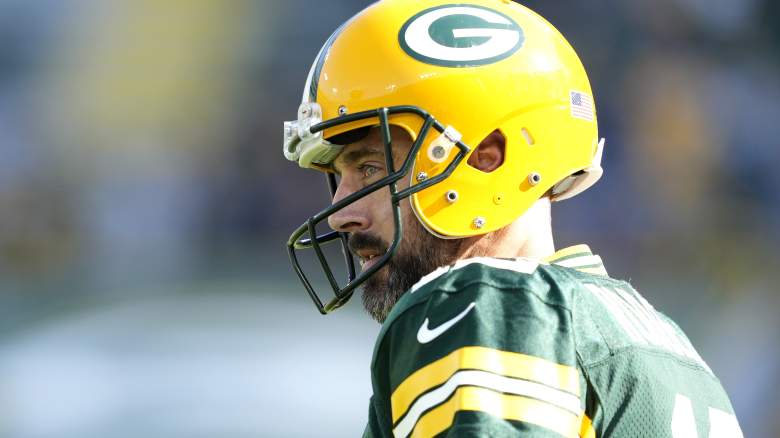
Getty Aaron Rodgers wasn't a fan of the roughing-the-passer call against Chiefs defender Chris Jones.
Aaron Rodgers understands it can be tough to be an NFL referee and that mistakes are going to happen from time to time, but the roughing the passer flag thrown against Kansas City’s Chris Jones in Week 5 is just another reminder to him that it is even tougher to be a defender in the modern-day game.
Rodgers — as a four-time NFL MVP quarterback — was asked about his opinion on two of the eggreious roughing-the-passer penalties that were called throughout Week 5 during his weekly appearance on The Pat McAfee Show and even he wasn’t sure what else Jones could have done to avoid his penalty on Monday Night Football.
“I personally am not begging for those calls, like that call [on Monday night],” Rodgers said on October 11. “I don’t know what else Chris Jones can do on that play. And that would not be a call that I’d be begging to get. The things I think are the most important are the shots to the head. That’s the most important thing. It’s the shots to the head and the unnecessary roughness ones where a guy doesn’t have to pick you up and throw you down or the two- or three-step shots.”
Roughing Calls Stir Up Debate Around NFL
The play in question occurred about two minutes before halftime with the Chiefs trailing 17-7 to the Las Vegas Raiders. With the ball in the Raiders’ hands, Jones got behind quarterback Derek Carr and crashed into him for what appeared to be a normal sack, stripping the ball in the process. Referee Carl Cheffers, however, threw a flag for roughing the passer because he felt Jones “landed on [Carr] with full body weight, negativing a drive-killing play that could have helped the Chiefs at the time.
There was also another one in Sunday’s game between Tampa Bay and Atlanta. On 3rd-and-5 with 3:03 left in the fourth quarter, Falcons defensive tackle Grady Jarrett sacked Tom Brady to make a crucial stop, but he was flagged for his hit because — as referee Jerome Booger put it in the postgame pool report — he “unnecessarily” threw him down.
“I think the intent of the rule is the protection of quarterback and it’s a quarterback-driven league, right?” Rodgers said. “We have to understand that, but the enforcement is very difficult for all referees. And I know both those referees, We’ve had them, both Jerome and Carl. They’re both great refs and I think they both felt like they made the right call. It’s heat-of-the-moment, it’s bang-bang, it’s quick. Those are difficult calls for sure, but it’s more difficult on defense. Because if I’m coaching defensive line and I’m sitting in with Chris Jones in a meeting on Wednesday, what am I telling him?”
Rodgers: Reviews ‘May Do More Harm Than Good’
There has been an understandable amount of outrage over roughing-the-passer penalties following a week in which two heavily-disputed ones were called. According to ESPN, the NFL’s competition committee is already planning to discuss the roughing-the-passer criteria once the 2022 season is over, but Rodgers is hoping their re-evaluations won’t go as far as to make them reviewable, as is the case with pass interference.
Here is why Rodgers feels reviewing roughing calls can do “more harm than good:”
Listen, it’s a tough job. I’m not bulls——-. It’s a tough job. Everything happens in fractions of seconds and you have to make decisions which could impact games [based] on what you’re seeing. I don’t think it’s to go down the road of reviewing it. I think we might end up with the same spot as pass interference where there’s gray areas and then one call changes the trajectory of all other calls that fit under that standard, and when we did pass interference, I don’t think what was accomplished was what we hoped. Like I said, one call refereed and interpreted a certain way changed the review process on every other play. I just think that’s what’s going to happen when you have a subjective call. There’s intent involved and when there’s intent involved it, on a foundational level, takes it out of a purely objective rule, and I think there’s so much gray area that it may do more harm than good.